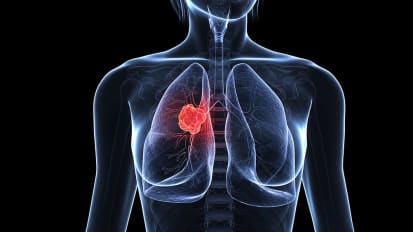
Resources
 Video
Video
Lung Cancer Screening and SPN in the Patient with COP
Patients with advanced Chronic Obstructive Pulmonary Disease (COPD) are at increased risk of lung cancer, and should be screened with low-dose CT.
 News
News
Molecular Profiling Continues to Shape the Future of Cancer Care
Unraveling the genome to reshape cancer care.
 News
News
High Expectations for Adoptive Cell Therapy for Treatment of Solid Tumors
A partnership between the Fox Chase solid tumor oncologists and their colleagues in bone marrow transplantation tests the potential of adoptive cell therapies for the treatment of solid tumors.
 Document
Document
Temple Healthy Chest Initiative: a New Approach to Lung Cancer Screening
Physicians at Temple Health have developed the Temple Healthy Chest Initiative to screen, diagnose, treat, and support patients who are at the greatest risk of developing lung cancer due to a history of smoking.
 News
News
Immunotherapy for Never Smokers with Non-Small Cell Lung Cancer
To further evaluate the use of immunotherapy for these patients with NSCLC, Treat is serving as a primary investigator in a nationwide Phase II, double-arm, randomized clinical trial of treatment-naïve never smokers without the EGFR driver ...
 Course
Course
GOLD International COPD Conference
Join us in person or online for an international comprehensive educational symposium on chronic obstructive pulmonary disease (COPD). This is the seventh consecutive year for this one-day COPD conference. Wednesday, November 16, 2022 from 8:00 AM – 6:00 PM EST
 Document
Document
Temple – Fox Chase Thoracic Surgery
The thoracic surgery program at Temple Health provides high-quality surgical care for a wide range of conditions, from benign to thoracic malignancies in the lungs, esophagus, airways, pleura, or chest wall.
 News
News
Pulsed Low-Dose-Rate Radiation Offers New Treatment Option for Variety of Solid Tumors
Clinicians at Fox Chase Cancer Center are exploring how an established radiation technique—pulsed low-dose-rate radiation (PLDR)—might benefit patients with a variety of solid tumors.
 News
News
Clinical Connections - Hypofractionation
Using hypofractionation, or hypofractionated radiation therapy, more radiation dose is delivered per treatment, so patients can complete their course of radiation therapy much faster than conventional treatment.